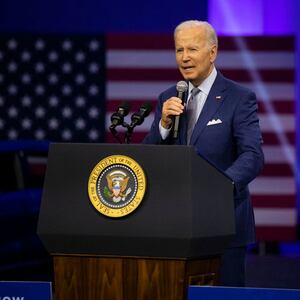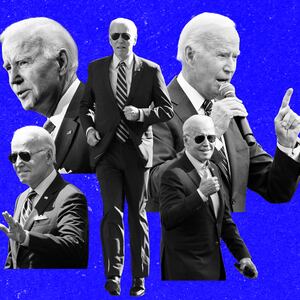A tentative agreement brokered by President Joe Biden between railroad unions and freight train companies is at risk of going off the rails—once again raising the prospect of a potential national railway strike that the president has warned could further disrupt the nation’s economy.
On Wednesday, a commanding majority of the Brotherhood of Railroad Signalmen voted down the tentative agreement that unions and railroad management had reached last month, joining the Brotherhood of Maintenance of Way Employees, the third-largest railroad union in the country, in rejecting the deal.
Brotherhood of Railroad Signalmen president Michael Baldwin said in a statement that railway management “seem to forget that the rank-and-file of their employees continued to perform their job each day through an unprecedented pandemic, while the executives worked from home to keep their families safe.” Baldwin added that the vote—in which 60 percent of the union’s participating members cast ballots against ratification—was the consequence of a “lack of good-faith bargaining” on the part of management.
ADVERTISEMENT
“For the first time that I can remember, the BRS members voted not to ratify a national agreement,” Baldwin said, “and with the highest participation rate in BRS history.”
The vote not to ratify the agreement, which must be approved by each of the country’s dozen railway unions in order to prevent a strike, could undercut Biden’s buzzer-beating victory last month in the waning days of the midterm election campaign. In mid-September, administration officials worked overnight to prevent a nationwide freight rail strike that would have put nearly a third of the nation’s transported goods at risk of a standstill.
At the time, Biden called the tentative agreement between unions and the National Carriers’ Conference Committee “a win for tens of thousands of rail workers,” with improved pay, better working conditions, and lower health care costs for tens of thousands of railway employees.
“This tentative agreement means that our economy can avert the significant damage any shutdown would have brought,” Biden said, thanking Transportation Secretary Pete Buttigieg, Tom Vilsack of the Department of Agriculture, and Marty Walsh of the Department of Labor.
Leadership of the Brotherhood of Railroad Signalmen, which just voted down the agreement, had been front-row attendees of the Rose Garden ceremony where Biden announced the tentative agreement. But lingering anger over the refusal of freight rail management to provide paid sick leave has been a major sticking point, particularly after the coronavirus pandemic, said Tony D. Cardwell, president of the Brotherhood of Maintenance of Way Employees.
“Railroaders are discouraged and upset with working conditions and compensation and hold their employer in low regard. Railroaders do not feel valued. They resent the fact that management holds no regard for their quality of life, illustrated by their stubborn reluctance to provide a higher quantity of paid time off, especially for sickness,” Cardwell said. “The result of this vote indicates that there is a lot of work to do to establish goodwill and improve the morale that has been broken by the railroads’ executives and Wall Street hedge fund managers.”
The National Carriers’ Conference Committee noted in a statement that half of the rail unions have already voted to ratify the agreement, which “include the largest wage increases in nearly five decades and pave the way for immediate payouts averaging more than $11,000 per railroader ahead of the holidays.”
The committee said the tentative agreement was hammered out “in partnership with the most labor friendly administration ever,” in reference to Biden, and said that “ample” paid time off allows rail workers to take leave if they or a family member become ill.
“Railroads remain committed to reaching contracts with our unions,” the committee said.
The clock is now ticking until Nov. 19, when the status quo or “cooling off” period in which rail workers and companies operate under prior contracts expires—the same day that Congress, which could vote to force unions to accept the proposed deal, begins a scheduled week-long break for the Thanksgiving holiday.
The Biden administration has raised concerns about such a vote, authorized under the Railway Labor Act, which would undercut unions opposed to the current terms.
On Wednesday, White House press secretary Karine Jean-Pierre emphasized that successful negotiations are “the responsibility of the parties involved to resolve this issue,” and called the potential of a congressional intervention “just deeply misguided.”
If a strike were to proceed, it could exacerbate lingering supply chain issues that have complicated the United States’ pandemic recovery and exacerbated the inflation pressure that could cost Democrats their majorities. Many basic commodities—including gas, grains, and water—are transported by freight rail, which means that a strike could affect prices not just on those products, but on all the goods and services that require them.
A work stoppage could also cause holiday travel nightmares just before Thanksgiving. Last month, when freight rail operations were only days from being suspended by a strike, Amtrak preemptively canceled long-route passenger service across the country in anticipation of a potential work stoppage. (While the majority of passenger rail travel in the Northeast Corridor would not be affected, most passenger trains in the country run on freight lines, meaning that a freight worker strike would affect those travelers.)
After news of the second vote not to ratify the agreement broke on Wednesday, Jean-Pierre told reporters that the current status quo period provides “adequate time” for negotiators “to continue their work and ensuring that our economy is under no immediate threat.”
The administration, Jean-Pierre said, is in “regular contact” with both sides of the negotiations, and urges each party “to really operate in good faith.”
But for Biden—whose personal fondness for trains and train travel is almost as conspicuous as his public support for organized labor—leaving the negotiations purely up to management and rail unions risks undermining his reputation as a mediator between the two.
Republicans have already begun sharpening their knives in the event of a possible strike.
“Uh-oh. Joe Biden’s tentative railroad union deal fell apart on Monday,” Rep. Jim Jordan (R-OH) posted on Twitter after the Brotherhood of Maintenance of Way Employees voted down the potential agreement. “Strike imminent? If so, get ready for prices to go even higher.”








